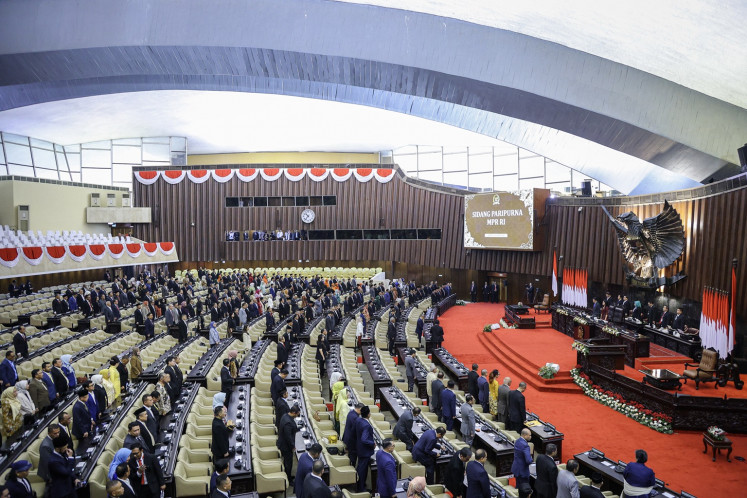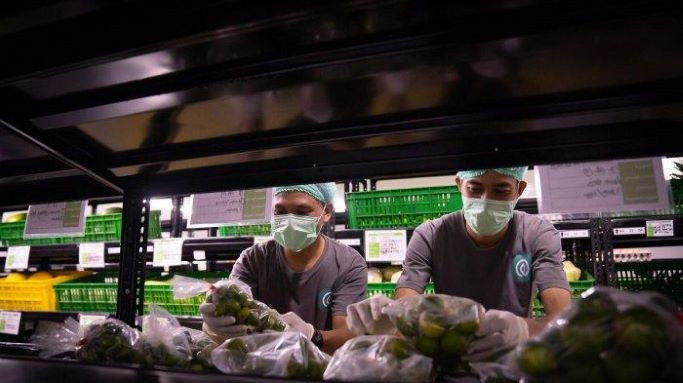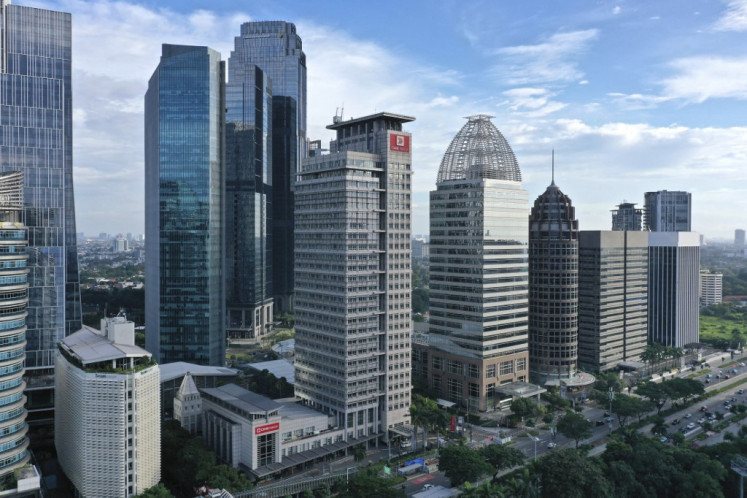Popular Reads
Top Results
Can't find what you're looking for?
View all search resultsPopular Reads
Top Results
Can't find what you're looking for?
View all search resultsStarting from zero
Jumali, the head of Salakan village in Bantul regency says his village is “starting from zero
Change text size
Gift Premium Articles
to Anyone
J
umali, the head of Salakan village in Bantul regency says his village is “starting from zero.
Moving: Waste is carted by bicycle in Salakan. — Photo By JP/Lea Jellinek
We are a poor village. Most of Salakan’s inhabitants are poor farmers, laborers and construction workers with household incomes of Rp 500,000 (US$58) a month or less and we plan to base our development on waste.”
A village planning to uplift its poor by working with waste. I hadn’t heard it expressed in those terms before but it was precisely what happened to Sukunan, where at least 20 percent of households have become wealthier because of its waste program.
After being chosen as village head in 2009, Jumali was looking for a solution to the waste problem in Salakan. Farmers were complaining that plastic bags and other waste thrown into rivers were blocking their irrigation canals and damaging their rice crops.
Some months later, Jumali discovered Sukunan. He was passing by and noticed brightly colored waste bins. He approached a farmer in the field and asked about the bins. Jumali was brought to Iswanto, a leader of the Sukunan waste management program, who invited Jumali to learn about the program free of charge.
Pride: Pak Jumali shows a potted plant from Salakan’s own village compost. The plants are currently in big demand by farmers. — Photo By JP/Lea Jellinek
Armed with what he learned from Sukunan, Jumali decided to make waste management the number one priority in Salakan. He personally collected waste from the river and rice fields and started to separate it. His neighbors looked on with surprise — they could not imagine why a village leader would do such a thing. Even though they were poor, they viewed waste as lowly; nobody wanted to touch it.
Rather than try to tell people what to do, Jumali wanted to set an example of how waste could be profitably managed. He said, “You cannot force people … you must give an example first. You have to be the example.”
Jumali said, “I am a poor man who only completed middle school. I have spent my life doing construction, farming, laboring and selling things.”
He is small and thin, browned by the sun, and has experienced poverty, hunger and hardship. His house is small and has no toilet. He empathizes with the poor, so when anyone in his community undergoes difficulties — like the poor neighbor who was giving birth and could not afford to go to the hospital — he spends his own energy, time and money to help.
Between 2009 and 2010, only 30 of Salakan’s 106 households were willing to separate their rubbish. Jumali said, “When I called a community meeting, only 4 of the 100 attending were ready to become active in the waste management program. It is always like this, only a few are prepared to get involved. The hardest thing is to open people’s minds and get them to participate.”
Plenty: Pak Jumali and a colleague admire their first organic eggplants and chilies, grown successfully from Salakan’s compost made from household waste. — Photo By JP/Lea Jellinek
To make the program more attractive, Jumali told the villagers that those who separated their own waste would not have to pay for its disposal.
Jumali learned that some university students had applied to do their fieldwork in a nearby village. He asked the students to come to Salakan village instead, on one condition — they focus on waste
management.
All university students are obliged to do voluntary work in villages, but they are often confused about what they should do. Half the time they sit around aimless. Jumali gave the students a clear focus.
He suggested they learn waste management from Sukunan and help promote it in Salakan. The students built a depot for waste recycling and composting and created a sign. They wrote funding proposals to the government and NGOs.
In 2010, Jumali traveled to Semarang and Surabaya to learn about compost. He and a few assistants in Salakan then managed to develop a dark, rich and moist compost. The university students tested the compost at the university laboratory, with excellent results.
‘The problem is, such a test costs Rp 400,000, so we can only do it once,” Jumali said.
The village now sells all the compost it makes, and demand outstrips supply.
Today, Jumali proudly leads me to the large plot of eggplants and chilies on the land he received from the government as payment for being village head. He is using this land to show villagers what excellent vegetables can grow from Salakan’s compost without artificial pesticides or fertilizers.
The plants look fresh, green and robust. “It is proof,” he said, “that our compost is good. I want all of my villagers to see and learn from this experiment.”
The Salakan program has been greatly encouraged by Pak Junaidi, the active volunteer coordinator who links government agencies with villagers doing waste management in Bantul. Junaidi introduced me to Jumali and Salakan village and obtained a contribution of Rp 2,000,000 for Salakan’s pioneering efforts as well as a motorcycle for collecting rubbish from the Bantul Environment Agency (BLH Bantul).
Equipped with the motorcycle, Jumali sought out wealthy people in neighboring villages with a waste problem. He connected with the village heads of these villages and asked them which households had nowhere to put their waste.
He offered to pick up each household’s waste for a fee of Rp 10,000. Currently, he has 40 people from other villages who want their waste collected, and aims to find another 60. This will bring in a monthly income of Rp 1,000,000 — enough to cover salaries for Salakan’s workers who pick up the waste.
Trial: Salakan residents observe the village’s waste and compost depot.— Photo By JP/Lea Jellinek
Salakan has started several other waste-based enterprises. Over 20 people are involved in collecting, separating, selling and making handicrafts from waste. Several others are employed in cutting aluminum-backed, colored sachets into pieces for handicrafts for Rp 6,000 a kilogram. The composting enterprise employs four people.
Jumali is also trialing organic farming, and five men are selling fruit and vegetable seedlings grown in the community’s compost to local farmers: again, demand outstrips supply. Jumali plans for each enterprise — waste management, composting, handicrafts, seedlings, organic farming — to do its own activities and marketing while remaining interconnected. He hopes new industries will be created and is prepared to support them with grants of Rp 500,000 each.
So far, Salakan has used the money raised from waste to build a new road leading to the recycling and composting depot, and plans to establish a preschool.
In the future, they want to plant more trees along the new road, expand their seedling nursery, and become an eco-village – like Sukunan, but with a difference.
“This program is not for individual profit. The long-term aim is to improve the lives of the poor. It is a village empowerment program, not a private business where only a small minority benefit,” Jumali said.













